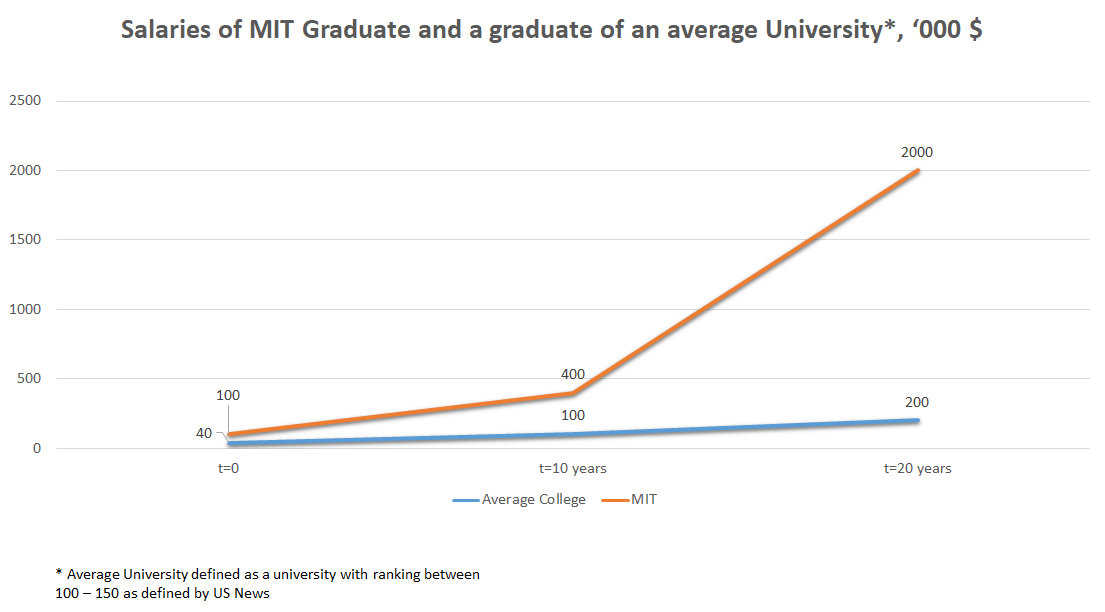What is the difference between MIT and an average university?
- Written by UnivAdmitHelp
- Category: Insights & Information
- Published on 13 Apr 2018

A lot of my students ask me whether it really matters that they get into top schools. We all know that getting into a top college like Harvard or Stanford is extremely difficult, and additionally these colleges are extremely expensive. More so, with the advent of MOOCs great content is freely available. Then, why should I try to get into a top-tier university like Columbia or Yale?
I view a university as a resource, among many others that are available to a student. Given that we are going through a period of information overload, there is no premium on information. Likewise, old educational methods around information dissemination are also increasingly becoming obsolete. A good university is ahead of time and really makes sure that you get curated experiences which help you learn in the most meaningful manner. MITis known for its bias for action learning and learning through doing. Stanford, on the other hand has seeped itself into a heightened problem-solving culture spanning across multiple anthropological and scientific dimensions. Caltech is burning the frontiers of algorithm design and is at theforefront of artificial intelligence based technologies. These universities offer the best in class resources and the experience of being there gives meaning to education and help you grow professionally and personally. Mediocre university is just that – probably dabbling in information arbitrage and not helping you become relevant either from today or tomorrow’s context.
Leading economist and Nobel Prize winner Paul Krugman did a ground-breaking research over the impact of ‘starting point’ and analyzed the salary data of Computer Science graduates from the top ten universities in the world and compared it to the salaries of graduates from universities ranked 100-150. The results were astounding. Not only the graduates of top universities get starting salaries which are about 2.5 times that of thegraduates from the lower ranked universities, but also these differences would get amplified over time in favor of graduates who had a great start. In about ten years from graduation, these differences would grow to 4X and over twenty years as much as 10X. This means that a graduate from MITwould start off earning $ 100 K as opposed to 40 K $ for a middling university… In ten years, the MIT graduate could be earning 400 K while theperson from the average university would grow his salary to just about 100 K. In twenty years they would be earning 2 MM $ and 200 K respectively! I would venture on to say that a top university equips you to survive in trying circumstances and gives you the capacity to learn and change with the times. In the context of increasing obsolescence of repetitive, predictable jobs and AI driven dooms-day scenarios (which may or may not materialize), we are looking at this difference to get amplified even further. I would predict that in another 10-15 years, while an MIT graduate could see his income swell manifold, the guy from the middling university might well find himself without any employment. Professor Eric Brynjolfsson of Sloan School of Management captures it beautifully when he empirically validates jobs getting concentrated at the top of the pyramid and the middle getting hollowed out. In the final reckoning, the start that you get would determine the journey that you undertake! (And may as well the end!!)
Getting into an average college is just not worth it! While it is extremely hard to get selected into a global top 10 program, it is worth the time and effort that you would spend on it. You will learn valuable skills in the process and like the proverbial hero who aimed for the stars but ended up in the treetops, even if you fail, you would still be better off!
Recent Posts
-

Comprehensive List of 30+ questions that High School Indian Parents and Students ask for US Admissions..
-

Common App Essay Tips 2025
-

Best extra-curricular activities for college admission for Indian students
-

How Many Universities Should You Apply To? Expert Tips for U.S. and U.K. Admissions for Indian Students
-

Step-by-Step Guide to Creating an Exceptional Capstone Project for Indian Students




